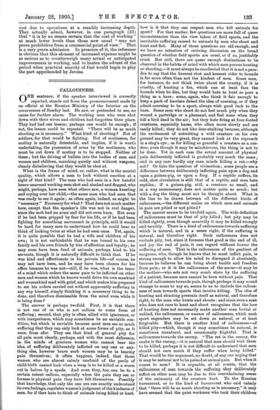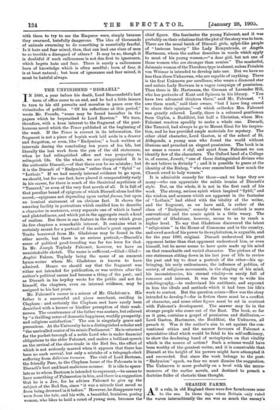What is the frame of mind, or, rather, what is
the mental quality, which allows a man to look without emotion at a sight of that kind? The man who had seen in a few hateful hours unarmed working men shot and slashed and flogged, who might, perhaps, have seen what others saw, a woman kneeling and crying over her child,—the same man who had seen that was ready to see it again ; as often again, indeed, as might be "necessary." Necessary for what ? That does not much matter here, except that the speaker's life was not in real danger, since the mob had no arms and did not even burn. But even if he bad been gripped by fear for his life, or if he had been fighting for something sacrosanct in principle, still it would be hard for many men to understand how he could bear to think of looking twice at what he had seen once. Yet, again, it is quite possible that be had a wife and children of his own; it is not unthinkable that he was bound to his own family and his own friends by ties of affection and loyalty; he may even have been fond of animals, perhaps kind to his servants, though it is naturally difficult to think that. If he was kind and affectionate in his private life—of course, he may not have been, and he may have been chosen for his office because he was not—still, if he was, what is the tenor of a mind which orders the same pain to be inflicted on other men and women which he knows would drive his own mankind and womankind mad with grief, and which makes him prepared to see his orders carried out without apparently suffering in any way himself, simply thinking it a necessary thing to be done, and therefore dismissable from the mind even while it is being done ?
The answer is perhaps twofold. First, it is that there is not one of us who is not callous to some form of suffering ; second, that pity is often allied with ignorance, or with inexperience, which may sometimes be an enviable con- dition, but which is enviable because most men see so much suffering that they can only look at some forms of pity, as it were, from afar. They see that kind of general pity for all pain most clearly, perhaps, and with the most deference, in the minds of gracious women who cannot bear the idea of suffering deliberately inflicted on any one or any- thing else, however brave such women may be in bearing pain themselves; it often happens, indeed, that those women who are almost calmly unafraid of the perils of child-birth cannot look when a wasp is to be killed or a worm cut in halves by a spade. And even they, too, can be to a certain extent callous, especially when the pain they see or foresee is physical pain they have felt themselves. Possibly that knowledge, that only the one sex can exactly understand its own feelings, regulates women's judgment of the kindness of men, for if they hate to think of animals being killed or hurt.
how is it that they can respect men who kill animals for sport ? For that matter, few questions are more full of queer inconsistencies than the view taken of field sports, and the inevitable suffering caused to animals by men who shoot and hunt and fish. Many of those questions are old enough, and we have no intention of reviving discussion on the broad question of whether field sports are cruel, or if so, justifiably cruel. But still, there are queer enough distinctions to be observed in the habits of mind with which men pursue hunting or shooting,—it must always be recollected that it is not a para- dox to say that the keenest shot and keenest rider to hounds is far more often than not the kindest of men. Some men, for instance, do not think twice about the cruelty, if it is cruelty, of hunting a fox, which can at least face the hounds when he dies, but they would hate to hunt so poor a thing as a -bare; some, again, who think it fair enough to keep a pack of harriers detest the idea of coursing, or if they admit coursing to be a sport, always wish good luck to the hare. Some men who shoot do not feel much pity when they wound a partridge or a pheasant, and feel none when they kill a bird dead in the air; but they hate firing at four-footed creatures, especially hares, who often move slowly and are easily killed; they do not like deer-stalking because, although the excitement of outwitting a wild creature on his own ground may be very great, they cannot look at the reproach in a stag's eye ; as for killing so graceful a creature as a roe- deer, even though it may be mischievous, the thing is not to be done. Yet in each case the actual amount of physical pain deliberately inflicted is probably very much the same ; and in any case hardly any man minds killing a rat,—why not ? Or take the question of vivisection ; some people see a difference between deliberately inflicting pain upon a dog and upon a guinea-pig, or upon a frog. If a reptile suffers, its cold, slow circulation is still that of a reptile, and men hate reptiles ; if a guinea-pig, still, a creature so small, and in a way unnecessary, does not matter quite so much ; but with a dog the thing must not be thought about. What is the line to be drawn between all the different kinds of callousness,—the different scales on which men and animals in pain are pitied or not pitied ?
The answer seems to be twofold again. The wide definition of callousness must be that of pity killed ; but pity may be killed rightly, even though assuredly it may be killed wrongly and terribly. There is a kind of callousness towards suffering which is natural, and in a sense right, if the suffering is natural, and therefore right. Such callousness does not exclude pity, but, since it foresees that good is the end of ill, and joy the end of pain, it can regard without horror the suffering of men. That is the callousness of the gentlest of surgeons, who, though he knows that he must inflict pain, is strong enough to allow his mind to disregard it absolutely, because he believes he can bring about health and freedom from pain; or it is the callousness of the nurse—it may be the mother—who sets not very much store by the suffering of a patient, because men cannot be born without pain. That kind of callousness towards pain, though perhaps it may sound strange to some to say so, seems to us to include the calloui- ness of men towards sports that involve killing. The idea of hunting and shooting presents itself as natural, and therefore right, to the man who hunts and shoots ; and since even a man who does not care to hunt and shoot recognises that the love of hunting does not necessarily make another man brutal or unkind, the callousness, or nuance of callousness, which such sport engenders may be set down as natural, or at least forgivable. But there is another kind of callousness—of killed pity—which, though it may sometimes be natural, is sometimes unnatural, and occasionally frightful. That is callousness towards the enemy. " The rat is the enemy, the snake is the enemy,—it is natural that men should wish them to be killed, perhaps it is not difficult to understand that men should not care much if they suffer when being killed." That would be the argument, no doubt, of any one urging that it may be natural not to be pained at animal pain. But when it comes to men ? It is arguable, at all events, that the callousness of men towards the suffering they deliberately inflict on other men may be due to this overwhelming sense of the animosity of the creature hurt. To the Russian bureaucrat, or to the kind of bureaucrat who said calmly that " there will be as much shooting as is necessary," it may have seemed that the quiet workmen who took their children
with them to try to see the Emperor were, simply because they swarmed, hatefully dangerous. The idea of thousands of animals swarming to do something is essentially fearfuL Is it hate and fear mixed, then, that can lead one class of men to so terrible a disregard of others ? It may be so, though it is doubtful if such callousness is not due first to ignorance, which begets hate and fear. There is surely a callousness born of knowledge which is often needful ; born of fear, it is at least natural; but born of ignorance and fear mixed, it must be hateful always.























































 Previous page
Previous page